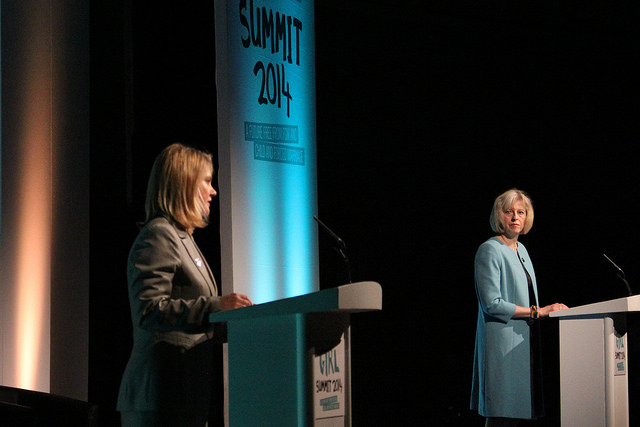Theresa May – a well-prepared geographer’s uneventful climb to the top
Theresa May is the UK’s new Prime Minister, with David Cameron having stepped down following what Alun Wyburn-Powell, here, describes as one of the ‘greatest unforced political errors in British history’ in calling and losing a referendum on the UK’s EU membership. But what might we expect from his successor? Given her age, experience, and political outlook, there is a chance that she’ll be judged on her performance in the role – dealing with what another of her predecessors described as ‘events’.

The New PM watches on. (Credit: DFID, CC BY 2.0)
David Cameron has made one of the greatest unforced errors in British political history, by gambling on calling the EU referendum and losing. In terms of his career and reputation, Cameron’s mistake was bigger than Conservative prime minister Stanley Baldwin’s error in calling an unnecessary election in 1923, on the issue of protection. Baldwin lost, but later came back to serve two more terms as premier. It is hard to imagine Cameron staging a return.
An ironic twist which may yet play out is that the result of the referendum could be declared void. As pointed out (now rather inconveniently) by Sir William Cash, the pro-Leave MP in the House Commons, but now given greater prominence by Dr Peter Catterall of the University of Westminster, the government failed to follow its own rules which it set out in the 2015 European Referendum Act. The government obliged itself to produce two documents, one that set out the benefits of membership and the other which set out the alternatives to membership. This did not happen and arguably the whole debate would have been much better informed if it had. The voters might get a second go. The experiences of 1974 and 1910, when we had two general elections in one year, suggest that there might be little change, but then little change could produce a different result.
Cameron’s motive in holding the referendum was to heal the split in the Conservative Party over Europe – this may yet be achieved, but not on his watch. Despite his personal demise, David Cameron’s party remains in power, the leaders of the Leave campaign have been defeated in the contest for the Conservative Party leadership and one of his three designated potential successors has taken over – Theresa May.
Theresa May, as many commentators are helpfully pointing out, is female. The BBC couldn’t help mentioning her taste in shoes in the second bullet point of its ‘Who is Theresa May?’ guide. As a female who wears shoes, Theresa May is in many ways quite unremarkable in British politics. She is the second female to become prime minister and the second from the Conservative Party – the party which had the first female MP to sit in the House of Commons and the party which introduced equal votes for men and women in 1928. The leaders of the Scottish Conservatives, the SNP, Plaid Cymru, Greens, Scottish Labour and the DUP are all female and possibly soon so will be the leaders of Labour and UKIP.
The Queen (also female and shoe-wearing) has now seen 13 changes of prime minister during her reign, only six of them resulted from a general election (Wilson twice, Heath, Thatcher, Blair and Cameron). The others, like May, arrived mid-term (Eden, Macmillan, Douglas-Home, Callaghan, Major and Brown).
Theresa May’s arrival is therefore in many ways unremarkable. She has a solid track record in office, which is more typical of the era of Eden, Macmillan, Callaghan, Major and Brown, of holding a key cabinet portfolio before becoming prime minister. The example of Blair and Cameron landing straight in the premiership without any ministerial experience is unique in modern times.
Both Blair and Cameron seem to have been undone by this inexperience. As revealed in the Chilcot Report, Tony Blair did not use cabinet procedures effectively over Iraq. If he had served in a cabinet before, he might have used a different approach to decision-making. In a similar vein, David Cameron seems to have underestimated the difficulty of holding the premiership, allegedly asking ‘How hard can it be?’ He now has the answer, at the end of his premiership. Theresa May knows it from the beginning. Like Margaret Thatcher, May is regarded as having been nervous in her earlier ministerial career, but to have overcome this through hard work and attention to detail.
May also arrives in the premiership with a whole herd of scapegoats. She plans to implement the will of the people, as expressed in the referendum. But, if the House of Commons is ruled to be sovereign and blocks the signing of Article 50 or the referendum result is overturned by legal means, May will not be to blame and will not be too distraught that others have prevented her taking the path which was not her original choice. If the economy turns down, this will be exactly what Theresa May and the Remain campaign were warning.
Theresa May has shown that she is literally down-to-earth. Her degree is in geography. As all climbers are aware, you need a knowledge of geography to get to the top. She has also not set up many hostages to fortune on the way up, with no grand ambitions for a ‘classless’ or ‘big’ society as Major and Cameron promised. She should be able to fulfil her objective of bringing more women into government, though her spokesperson has rather over-egged her role with a claim that May ‘set up the campaign to elect more female MPs’. Many could argue that this campaign actually started before May was even born.
May is under little pressure to hold an early general election. If she does, she has the luxury of being fairly sure that she would win. While May was drawing up her cabinet list, the Leader of the Opposition, Jeremy Corbyn was in a meeting to decide whether his party’s internal rules allow him to stand in a contest for the job he already has, despite most of his parliamentary colleagues having no confidence in him. If May waits, as John Major showed, a Conservative government that runs out of time during a recession can still be re-elected.
As Theresa May’s ministerial career, age and gender are all within the bounds of a typical British prime minister, she should end up, rightly, being judged on her actual performance in office, dealing with ‘events’, in the words of her predecessor Harold Macmillan. It could all come down to ‘events, dear girl, events’.
—
Note: this post represents the views of the author and not those of Democratic Audit or the LSE. Please read our comments policy before posting.
—
 Dr Alun Wyburn-Powell has a first degree was in geography, but he also holds a PhD in political history. His most recent book is Political Wings, a biography of William Wedgwood Benn, grandfather of Hilary Benn. He has also published the only long-term study of political defections in Defectors and the Liberal Party 1910 to 2010 – a study of inter-party relations (Manchester University Press) now out in paperback. He can be found on Twitter @liberalhistory.
Dr Alun Wyburn-Powell has a first degree was in geography, but he also holds a PhD in political history. His most recent book is Political Wings, a biography of William Wedgwood Benn, grandfather of Hilary Benn. He has also published the only long-term study of political defections in Defectors and the Liberal Party 1910 to 2010 – a study of inter-party relations (Manchester University Press) now out in paperback. He can be found on Twitter @liberalhistory.





 Democratic Audit's core funding is provided by the Joseph Rowntree Charitable Trust. Additional funding is provided by the London School of Economics.
Democratic Audit's core funding is provided by the Joseph Rowntree Charitable Trust. Additional funding is provided by the London School of Economics.
Theresa May – a well-prepared geographer’s uneventful climb to the top. https://t.co/d3KWmPS7Ua
#TheresaMayPM – a well-prepared geographer’s uneventful climb to the top https://t.co/3B2E1YItY2
Theresa May – a well-prepared geographer’s uneventful climb to the top https://t.co/CGrxnIhek7
Theresa May – a well-prepared geographer’s uneventful climb to the top https://t.co/d3KWmPS7Ua
Theresa May – a well-prepared geographer’s uneventful climb to the top https://t.co/OVXiv3nVxZ https://t.co/bQIZgpFny9